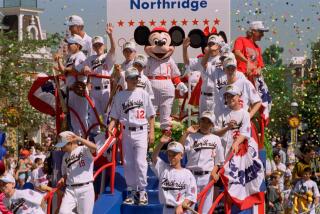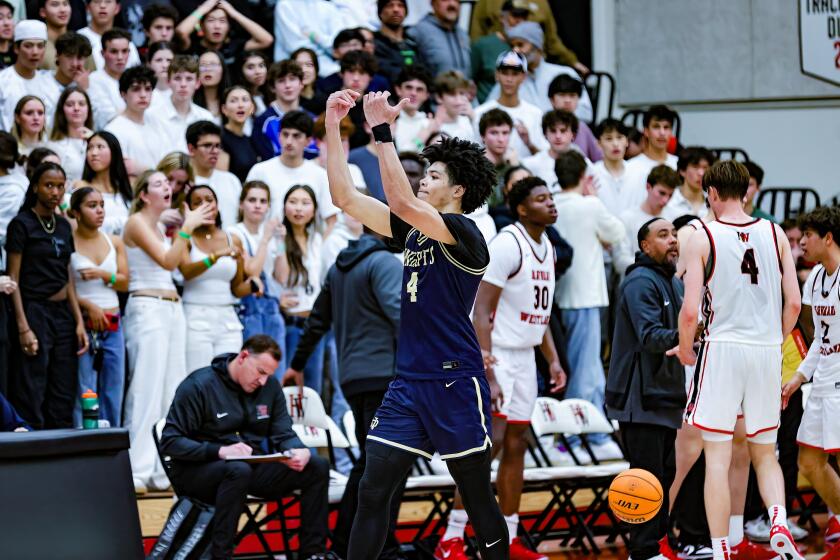It Might Be Requiem Time for the Matadors
- Share via
NORTHRIDGE — An unyielding march toward eliminating baseball at Cal State Northridge is becoming funereal. Early next week, it might be time to break out the shovels and toss dirt on a proud program that in 39 years won 1,267 games, 10 conference championships and two national titles despite enormous handicaps.
Other numbers are more important to Northridge administrators. A tight budget must be met. It has also been determined that whatever athletes are churned out by the university must be in ratio--boy, girl, boy, girl.
No amount of dismay and outrage from players, coaches and boosters, past and present, seems to matter.
The person whose ear they must bend, Northridge administrator Ron Kopita, is blissfully tossing a line into a Minnesota lake, on vacation and unavailable while everyone associated with Matador baseball is in limbo.
Nero fiddled. Kopita fished.
This week, Dick Enberg, a Northridge assistant coach from 1962-64, lamented the situation while in the NBC broadcasting booth at the French Open.
“It breaks my heart,” Enberg said. “It’s been such a terrific program. I saw its early growth and of course, it has gone way beyond that.
“The baseball I learned at Northridge is one of the qualities that allowed me to move on and work as an Angel announcer.”
Despite a puny budget and modest facilities, the program consistently produced success stories. In the 1960s, there was Enberg and catcher Dale Williams, who is now an NFL referee. In the 1970s, there were major league stars Lyman Bostock and Jason Thompson. In the 1990s, All-Americans Robert Fick and Adam Kennedy blossomed at humble Matador Field.
Yet, to meet court-mandated gender-equity standards and stem a recent spate of overspending by the athletic program, Northridge is poised to cut the five men’s sports not belonging to the Big Sky Conference--baseball, volleyball, soccer, swimming and golf.
An announcement is expected Tuesday or Wednesday, when Kopita returns from vacation.
Will baseball be cut?
Before leaving on his fishing trip, Kopita’s parting shot provided a strong hint: “You can rip it right off and have a sharp pain for a short time, or you can try to ease it off and feel a slow pain. I like to rip it off.”
Replied baseball Coach Mike Batesole, who has compiled a 94-38-1 record in two seasons: “This program is not just a thing you can rip a Band-Aid off of. These are people. This is not a sore.”
Sore is the sentiment of those close to the program. A sampling:
* Bill Kernen, the coach who presided over the program stepping up to Division I in 1991 and qualify for the NCAA tournament its first three seasons at that level: “The athletic department is guaranteeing itself eternal mediocrity. [The administration] wants athletics to be no more or less important than the travel agency in the student union.
“When we went Division I we put Northridge on the map. The school had never been on national television, except maybe for having a riot. [Northridge President] Blenda Wilson said at one point that athletics is the front porch of the university. It was an insightful statement on her part, but unfortunately it was just rhetoric. I guess now it’s not even the back porch. It’s the outhouse.”
* Bob Hiegert, the coach who won 591 games and two Division II national championships from 1965-84 before becoming athletic director. He was forced to resign in July, 1995, and now is a Northridge kinesiology professor:
“This is the panic at the last second, crisis management at its worst. Even if these programs are saved, they have been mortally wounded. You don’t rumor about dropping programs, then delay it while somebody goes on vacation. The damage is done.
“Looking at what is good for the university down the road, those are sports they should be hanging on to. Northridge baseball and volleyball have national prominence and income potential. It’s the muscle that will be missing.”
* Stan Charnofsky, Northridge coach from 1962-66 and current professor of educational psychology and counseling:
“I’m in favor of equal opportunity and gender opportunity, but there has to be some realism in it. It would be foolish, very foolish to cut out baseball.
“Guys who I coached are today achievers in society, business people, professors, a police captain. The baseball program brings honor to the university. There is a history there.”
* Gil Kubski, a Northridge outfielder in the 1970s who went on to have a short major league career, is a scout with the Baltimore Orioles and runs a fall scout team that plays at Matador Field:
“My first reaction was there’s no way they’d cut baseball. My second reaction is that any university that would do what it did to Bob Hiegert is capable of doing anything. That made me afraid for the program.
“I’m from Granada Hills High and Northridge was the place to play. You got more work than you knew what to do with until the sun went down every day. And that hasn’t changed over the years. The program simply got better and better.”
* Phil Horvat, whose son, Eric, is a Hart High infielder who signed a letter of intent to play at Northridge next season:
“We’re dumbfounded. I phoned Kopita and told him I will not let this go. We are in the baseball family at Northridge, we are under contract. We are being held in limbo but we are not going to give up. Eric is still planning on playing there.
“The field conditions aren’t the best but Mike Batesole overshadows everything. He is the best coach in the U.S. His attributes totally outweigh all the negatives CSUN might have.”
* Joe Buttitta, a radio and television sportscaster, pitched at Northridge from 1960-63, was the university’s first sports information director and broadcast Matador football games until 1994:
“I hold Wilson and Kopita responsible for this. They came from small-school programs and are in over their head. There is no doubt about it. They came in and eliminated all tradition at Northridge.”
* Bob Bennett, the longtime Fresno State coach who has been an outspoken advocate of college baseball for 30 years:
“It makes me want to vomit when I see a school taking the easy way out by taking scissors and cutting programs. It would be different if the program never wins and there is no interest. But with the achievement at Northridge, it’s mind-boggling that someone could even entertain the thought of casting that program out.”
* Robert Fick, the Matador catcher in 1995-96, who is among 38 Northridge All-Americans. He is now a Detroit Tigers’ minor league player:
“It’s hard to believe that after all Hiegert did, all Kernen did, and what Batesole’s done that it can all be wiped away basically because of money. We’ve become a school to be reckoned with, competing on the same level as the best schools with the most resources. For it all to end is frustrating and disappointing.”
From a record of 16-9 in its first full season to the 42-20-1 mark this year, Northridge has won nearly 60% of its games.
From Tony Davila, an all-conference selection from 1962-64, to Adam Kennedy, who led the nation in hits the past two years and was drafted Tuesday in the first round by the St. Louis Cardinals, the program has consistently turned out outstanding players. Kennedy will be the 101st Matador to become a professional player.
Along the way, the program has reflected the changing ethnic makeup of the Valley. Only 3% of college baseball players are Latino or African-American, yet Northridge had seven Latinos and three African-Americans on a 29-man roster this season.
Baseball, like the other sports targeted for elimination, is also a sport central to the interests of the Valley region, a nationally recognized hotbed of talent. Supporters ask: How can the only university in the Valley fail to offer sports so central to the community’s identity?
“The community has taken to the baseball program more lately than they did when I played,” said Steve Wold, a Matador all-conference pitcher in 1976 whose son, Greg, is a standout at Chatsworth High. “I’d take my son there on a Sunday, and man it’s great, a lot of my old teammates and a lot of Greg’s friends are there.”
Because the Matadors are an independent, games against top opponents on weekends were few. They drew well when hosting a ranked opponent during the week: a crowd of 805 attended the game against UCLA in February and 628 the game against Cal State Fullerton in January. However, average home attendance was about 300.
Under Batesole, Northridge has recruited well in the region. Ten current players are from the Valley area as are several recruits. Most, like Horvat, are holding tight until next week.
Four players who will be sophomores next season--Matt Pitstick, Adrian Mendoza, Jeremy Sickles and John Wilson--left Friday for a summer team in Santa Maria. They’ll hear the news from there.
“I’m lost with it all, it’s frightful, but I’m putting it aside until it happens,” said Pitstick, an outfielder from Royal High.
Urgency is a greater issue for Justin Cuellar, a left-handed pitcher from College of the Sequoias who signed a letter of intent only days before Northridge announced that cuts must be made.
“Other schools are giving out scholarship money and we’re stuck waiting for a decision by a guy who is gone fishing,” said Joseph Silva, Cuellar’s brother-in-law. “It stinks and it’s going to get ugly.”
Taking the heat in Kopita’s absence is Northridge Athletic Director Paul Bubb. As disappointed as Batesole is, he believes anger directed at Bubb is misplaced.
“This is a time when people are getting bitter and upset, but I do have respect for the difficulty of this decision,” Batesole said. “The one caught in the middle is Paul, and I don’t think this is even his decision.”
Bubb has presented to Kopita several options to reach the budget and gender-equity requirements. Kopita will make his choice public early next week, Bubb said.
“We are determining how can we be competitive in the sports we have; how we can come into compliance with gender-equity requirements and fulfill our obligations to the Big Sky Conference,” Bubb said.
“Ron and I are in agreement that those are the parameters.”
Should baseball fall outside those parameters, worst fears will be realized.
“My phone has been ringing every 10 seconds for a week with extremely angry people,” Batesole said. “The whole community has gotten into this. People are very disturbed that the kids who have committed to come here and the ones already here will miss out on a program that is built on more than baseball.
“We teach kids in an applied manner the principles of sacrifice and accountability, getting along and working hard on a daily basis, all the things that will make them great employees. These kids will be cheated out of that opportunity.”
More to Read
Get our high school sports newsletter
Prep Rally is devoted to the SoCal high school sports experience, bringing you scores, stories and a behind-the-scenes look at what makes prep sports so popular.
You may occasionally receive promotional content from the Los Angeles Times.







